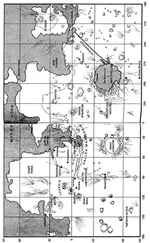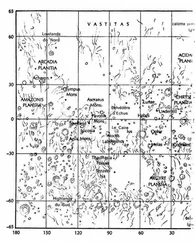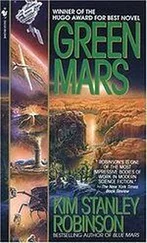“That depends,” Ann said absently, screwing the frame of the little borer into the ice. Her darkened faceplate turned up at Nadia. “If the terraformers have their way, this will all go like dew on a hot morning. Into the air to make pretty clouds.”
“Would that be so bad?” Nadia asked.
Ann stared at her. Through the tinted faceplate her eyes looked like ball bearings.
That night at dinner she said, “We really ought to make a run up to the pole.”
Phyllis shook her head. “We don’t have the food or air.”
“Call for a drop.”
Edvard shook his head. “The polar cap is cut by valleys almost as deep as Borealis!”
“Not so,” Ann said. “You could drive straight to it. The swirl valleys look dramatic from space, but that’s because of the difference in albedo between the water and the CO2. The actual slopes are never more than six degrees off the horizontal. It’s just more layered terrain, really.”
George said, “But what about getting onto the cap in the first place?”
“We drive around to one of the tongues of ice that drop to the sand. They’re like ramps up to the central massif, and once there, we drive right to the pole!”
“There’s no reason to go,” Phyllis said. “It’ll just be more of what we see here. And it means more exposure to radiation.”
“And,” George added, “we could use what food and air we do have to check out some of the sites we passed on the way up here.”
So that was their point. Ann scowled. “I’m the head of the geological survey,” she said sharply. Which may have been true, but she was a horrible politician, especially compared to Phyllis, who had any number of friends in Houston and Washington.
“But there’s no geological reason to go to the pole,” Phyllis said now with a smile. “It’ll be the same ice as here. You just want to go.”
“Well?” Ann said. “Say I do! There are still scientific questions to be answered up there. Is the ice the same composition, how much dust— everywhere we go up here we collect valuable data.”
“But we’re up here to get water. We’re not up here to fool around.”
“It’s not fooling around!” Ann snapped. “We obtain water to allow us to explore, we don’t explore just to obtain water! You’ve got it backwards! I can’t believe how many people in this colony do that!”
Nadia said, “Let’s see what they say at base. They might want us to help with something there, or they might not be able to send a drop, you never know.”
Ann groaned. “We’ll end up asking permission from the U.N., I swear.”
She was right. Frank and Maya didn’t like the idea, John was interested but noncommittal. Arkady supported it when he heard of it, and declared he would send a supply drop from Phobos if necessary, which given its orbit was impractical at best. But at that point Maya called Mission Control in Houston and Baikonur, and the argument rippled outward. Hastings opposed the plan, but Baikonur, and a lot of the scientific community, liked it.
Finally Ann got on the phone, her voice very curt and arrogant, though she looked scared. “I’m the geological head here, and I say it needs to be done. There won’t be any better opportunity to get onsite data on the original condition of the polar cap. It’s a delicate system, and any change in the atmosphere is going to impact it heavily. And you’ve got plans to do that, right? Sax, are you still working on those windmill heaters?”
Sax had not been part of the discussion, and he had to be called to the phone. “Sure,” he said when the question was repeated. He and Hiroko had come up with the idea of manufacturing small windmills, to be dropped from dirigibles all over the planet. The constant westerlies would spin the windmills, and the spin would be converted to heat in coils in the base of the mills, and this heat would simply be released into the atmosphere. Sax had already designed a robotic factory to manufacture the windmills; he hoped to make them by the thousands. Vlad pointed out that the heat gained would come at the price of winds slowed down— you couldn’t get something for nothing. Sax immediately argued that that would be a side benefit, given the severity of the global dust storms the wind sometimes caused. “A little heat for a little wind is a great trade-off.”
“So, a million windmills,” Ann said now. “And that’s just the start. You talked about spreading black dust on the polar caps, didn’t you, Sax?”
“It would thicken the atmosphere faster than practically any other action we could take.”
“So if you get your way,” Ann said, “the caps are doomed. They’ll evaporate and then we’re going to say, ‘I wonder what they were like?’ And we won’t know.”
“Do you have enough supplies, enough time?” John asked.
“We’ll drop you supplies,” Arkady said again.
“There’s four more months of summer,” Ann said.
“You just want to go to the pole!” Frank said, echoing Phyllis.
“So?” Ann replied. “You may have come here to play office politics, but I plan to see a bit of this place.”
Nadia grimaced. That ended that line of conversation, and Frank would be angry. Which was never a good idea. Ann, Ann. .
The next day the Terran offices weighed in with the opinion that the polar cap ought to be sampled in its aboriginal condition. No objections from base, though Frank did not get back on the line. Simon and Nadia cheered: “North to the Pole!”
Phyllis just shook her head. “I don’t see the point. George and Edvard and I will stay down here as a back-up, and make sure the ice miner is working right.”
• • •
So Ann and Nadia and Simon took Rover Three and drove back down Chasma Borealis and around to the west, where one of the glaciers curling away from the cap thinned to a perfect rampway. The mesh of the rover’s big wheels caught like a snowmobile’s drivetrain, running well over all the various surfaces of the cap, over patches of exposed granular dust, low hills of hard ice, fields of blinding white CO2 frost, and the usual lace of sublimed water ice. Shallow valleys swirled outward in a clockwise pattern from the pole; some of these were very broad. Crossing these they would drive down a bumpy slope that curved away to right and left over both horizons, all of it covered by bright dry ice; this could last for twenty kilometers, until the whole visible world was bright white. Then before them a rising slope of the more familiar dirty red-water ice would appear, striated by contour lines. As they crossed the bottom of the trough the world would be divided in two, white behind, dirty pink ahead. Driving up the south-facing slopes, they found the water ice more rotten than elsewhere, but as Ann pointed out, every winter a meter of dry ice sat on the permanent cap to crush the previous summer’s rotten filigree, so the potholes were filled on an annual schedule; and the rover’s big wheels crunched cleanly along.
Beyond the swirl valleys they found themselves on a smooth white plain, extending to the horizon in every direction. Behind the polarized and tinted glass of the rover’s windows the whiteness was unmarred and pure. Once they passed a low ring hill, the mark of some relatively recent meteor impact, filled in by subsequent ice deposition. They stopped to take borings, of course. Nadia had to restrict Ann and Simon to four borings a day, to save time and keep the rover’s trunks from being overloaded. And it wasn’t just borings: often they would pass black isolated rocks, resting on the ice like Magritte sculptures— meteorites. They collected the smallest of these and took samples from the larger ones, and once passed one that was as big as the rover. They were nickel-iron for the most part, or stony chondrites. Chipping away at one of these, Ann said to Nadia, “You know they’ve found meteorites on Earth that came from Mars. The reverse happens too, although much less often. It takes a really big impact to jack rocks out of Earth’s gravitational field fast enough to get them out here— delta V of fifteen kilometers per second, at least. I’ve heard it said that about two percent of the material ejected out of Earth’s field would end up on Mars. But only from the biggest impacts, like the KT boundary impact. It would be strange to find a chunk of the Yucatan here, wouldn’t it?”
Читать дальше
Конец ознакомительного отрывка
Купить книгу












